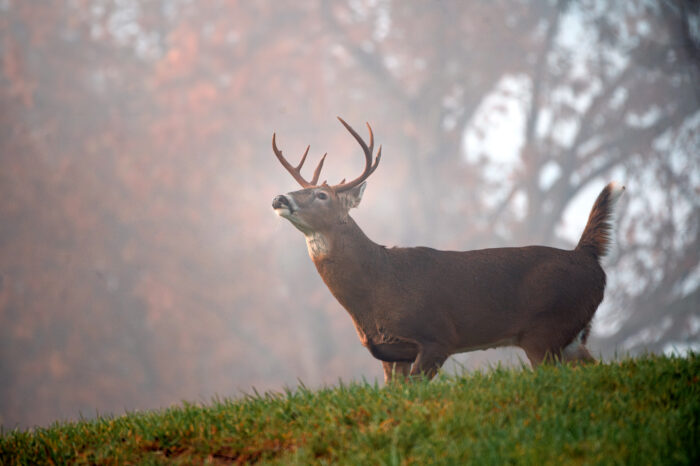Tips for a safe and successful buck firearms season
West Virginia’s buck firearms season is a cherished tradition that excites hunters statewide. Alongside the thrill of the hunt, knowing and following the season’s rules and regulations is essential to ensure a safe, ethical and enjoyable experience. Here are some of the most common questions hunters have about the buck firearms season, with answers to help you prepare for a safe and successful season.
What licenses and stamps are required to hunt during the buck firearms season?
New and experienced hunters must have the correct licenses and permits to participate in West Virginia’s buck firearms season. Proper licensing helps hunters comply with state regulations and supports wildlife conservation and sustainable hunting practices across the state.
Resident Hunter Licenses
To hunt deer during buck firearms season, resident hunters need one of several license options. These include Class X, X3, XP, XP3, XJ, AHJ, AB-L, A-L, XS, A+CS or AH+CS, with free licenses available for qualifying individuals such as active-duty military personnel, disabled veterans, former POWs, Class DT license holders, youth under age 15 or senior citizens.
Nonresident Hunter Licenses
Nonresident hunters require Class E+CS/LE, AAH+CS/LE, XXJ+CS/LE, AAHJ+CS/LE, DT, or E-L licenses. For those hunting on National Forest lands, a valid Class I license is required in addition to any other relevant licenses.
Stamps
Hunters can take an additional deer for residents and non-residents if they purchase a Class RG stamp (for residents) or Class RRG stamp (for nonresidents) or resident landowners hunting on their own property. However, this extra deer must be taken following specific county rules and season regulations, so checking the requirements in advance is essential.
For a complete list of valid license and stamp combinations for every hunting season, see page 46 in the West Virginia Hunting Regulations.
What Are the Bag Limits for Buck Firearms Season?
Bag limits are an essential part of hunting regulations. They help manage deer populations sustainably and maintain a balanced ecosystem. Understanding these limits ensures hunters enjoy the season responsibly and stay within legal guidelines.
For West Virginia’s buck firearms season, the primary bag limit is one antlered deer, defined as any deer with one or both antlers visible more than 3 inches above the hairline. Hunters may take an additional antlered deer with a valid Class RG (for residents) or Class RRG (for nonresidents) stamp, or if they are resident landowners hunting on their land. These stamps must be purchased before the season opens and are valid across all counties where the buck firearms season is open.
Hunters are restricted to a maximum of two antlered deer during the regular deer seasons and the Mountaineer Heritage Season combined, except in designated CWD Containment Areas or for those holding Class XS licenses, who may take up to three antlered deer. Only one antlered deer may be harvested per day, and hunters may need to harvest an antlerless deer before taking a second buck (see below).
Get ready for fall hunting adventures by preparing to field tag and check in your game.
Do I have to harvest an antlerless deer before I harvest a second buck?
Specific regulations in some counties require hunters to take an antlerless deer before harvesting a second buck, a rule designed to support balanced deer population management.
In nine areas, hunters must take an antlerless deer before harvesting a second buck in that same county. These areas include Berkeley, the southern part of Greenbrier, Hampshire, Hardy, Jefferson, the eastern part of Mineral, Monroe, Morgan and Wood counties.
The antlerless deer may be taken during any regular deer season that permits antlerless hunting. This rule applies across all regular deer seasons and the Mountaineer Heritage Season, and hunters should check which counties they plan to hunt in if they wish to harvest a second buck.
What types of equipment are legal to be used for deer hunting?
In West Virginia, hunters may use rifles, pistols, shotguns, muzzleloaders, crossbows and bows, but specific restrictions apply. Using only permitted equipment supports ethical hunting practices and keeps hunters within legal bounds.
Legal rifles include centerfire rifles (excluding fully automatic rifles) and rimfire rifles of .25 caliber or larger. Pistol or revolver users must have a firearm with a straight-walled cartridge of .357 magnum or larger or a bottlenecked cartridge of .24 caliber or larger, along with a Class A-1 stamp.
Muzzleloading rifles, with or without scopes, and single-shot muzzleloading pistols of .38 caliber or larger (Class A-1 stamp required) are permitted. Shotguns must be loaded with solid ball ammunition, while air rifles need to be .45 caliber or larger with bullets weighing 200 grains or more.
For crossbows, hunters need a draw weight of at least 125 pounds with arrows or bolts that are at least 16 inches long, and crossbows must have a working safety mechanism.
Where Can I Hunt During Buck Firearms Season?
West Virginia offers a range of options, from public lands to private properties, though regulations and requirements vary across locations.
West Virginia is home to 96 wildlife management areas (WMAs), eight state forests and nearly 1.1 million acres of national forest land that provide public hunting opportunities. Together, these areas offer over 1.6 million acres of public hunting grounds managed through cooperation between the U.S. Forest Service and the WVDNR. To find public hunting land near you, visit mapwv.gov/huntfish.
If the property is marked by fences, purple paint, or posted signs, written permission is required for hunters wishing to hunt on private land. This permission must always be in the hunter’s possession to comply with state hunting laws.
Buy your license and stamps today
Ready to join the hunt this buck firearms season? Purchasing your hunting license and necessary stamps today ensures you’re fully prepared. Let’s make this season a safe, enjoyable, and memorable one for all!

